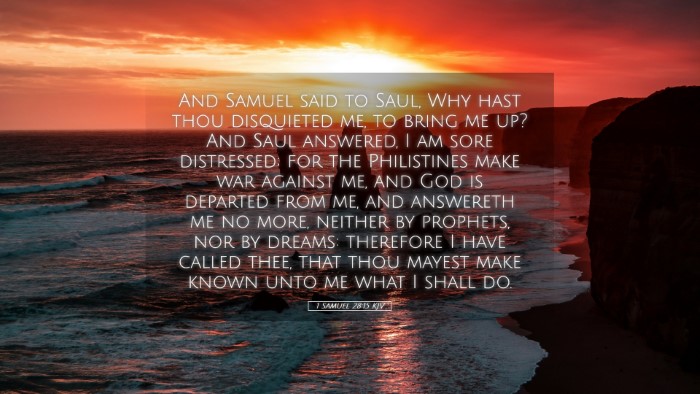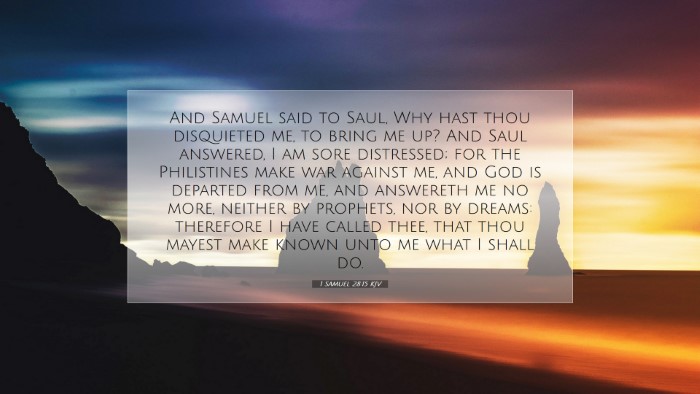Commentary on 1 Samuel 28:15
Text of the Verse: "And Samuel said to Saul, 'Why have you disturbed me by bringing me up? I am greatly distressed; for the Philistines make war against me, and God has departed from me and does not answer me anymore, neither by prophets nor by dreams. Therefore I have called you, that you may reveal to me what I should do.'" - 1 Samuel 28:15
Introduction
This passage depicts a unique and haunting moment in the history of Israel, where King Saul, in desperation, seeks counsel from the deceased prophet Samuel. This act raises significant theological and moral questions, inviting deep reflection on God’s sovereignty, the role of the Spirit, and the dangers of divination. The insights from various public domain commentaries will enrich our understanding of this critical juncture in Saul's life and Israel's history.
Contextual Background
The context of 1 Samuel 28 highlights the decline of Saul's kingship. Having fallen out of favor with the Lord due to disobedience, Saul finds himself in a dire predicament as the Philistines threaten Israel. The absence of divine communication through dreams or prophets leaves him in profound despair. As Matthew Henry notes, this illustrates Saul’s desperate and forlorn state, illustrating the spiritual crisis of a king abandoned by God.
The Implications of Seeking the Dead
Saul’s decision to consult a medium raises significant ethical considerations. Albert Barnes comments on this act, pointing out that it stands in stark contrast to the Law of Moses, which explicitly forbids necromancy. This act underscores Saul's confusion and desperation. Rather than turning to the living God in repentance, he seeks guidance from the deceased, representing a tragic misplacement of faith.
The Appearance of Samuel
When Samuel does appear, his words carry a profound weight. He addresses Saul's actions and the reasons for his distress. Adam Clarke notes that Saul’s initial fear upon hearing Samuel’s voice reflects not just the awe of a prophet’s presence, but the dread of facing divine judgment. Samuel’s inquiry, “Why have you disturbed me?” serves a dual purpose: it highlights Saul’s insolence and the weight of the tragedy that has unfolded within Saul’s life.
The Distress of Samuel
Samuel expresses his own distress over Saul's situation, illustrating a deep connection between God's appointed leaders and their people. This sense of distress also suggests that the spiritual wavelength of the nation is suffering; as Saul's relationship with God deteriorates, so too does the health of the nation. This is a critical point for theologians to note—the leadership’s spiritual condition is often reflective of the people they govern.
God’s Silence
Perhaps one of the most compelling aspects of 1 Samuel 28:15 is the notion that “God has departed from me.” Saul's acknowledgment of God’s silence speaks volumes about the consequences of persistent disobedience. Matthew Henry posits that God’s withdrawal signifies not merely abandonment, but also serves as a divine lesson. It highlights the necessity of a relationship with God built upon obedience and trust. This sentiment echoes through ages, reminding believers of the importance of maintaining their walk with God.
Saul's Desperation and Final Plea
In the climax of this passage, Saul's plea for guidance underscores the dinner of choices made in desperation. He turns to the dead instead of seeking God, revealing a tragic pivot from faith to fear. Albert Barnes rationalizes that Saul’s actions, driven by fear of the imminent battle, reflect a desperate grasp at hope amidst chaos. Yet, in this pivotal moment, there is a chilling sense that Saul understands deep down that he is beyond God’s reach.
Theological Reflections
This narrative compels us to reflect on several theological implications:
- The Nature of God’s Communication: The silence of God is profound. It indicates the serious consequences of sin and disobedience. It challenges believers to evaluate their lives and ensure they are in tune with God's voice.
- The Role of Leadership: Saul's actions serve as a warning to leaders about the necessity of godly counsel and the dangers of leading in disobedience. A leader’s spiritual health is critical for the well-being of the people.
- The Cost of Disobedience: Saul's descent into despair illustrates the cost of living outside of God’s will. It invites us to consider the far-reaching effects of our choices.
- The Reality of Spiritual Warfare: The Philistines symbolize external spiritual battles, yet they are met with Saul’s internal spiritual struggles. This duality is significant for believers today, who must recognize that spiritual conflict often happens both externally and internally.
Conclusion
1 Samuel 28:15 serves as a sobering reminder of the grave consequences that come from estrangement from God. Samuel’s appearance underscores the reality that spiritual authority persists beyond physical death, and Saul’s desperate actions reveal the tragic lengths to which the human spirit may go when faced with loss of communion with the divine. For pastors, students, and theologians alike, this passage is an invitation to explore the depths of reliance on God, the importance of obedience, and the grave ramifications of turning away from His guidance. As we reflect on Saul's story, may we strive for a deeper relationship with God, ensuring that we remain attuned to His voice amidst the noise of life.


